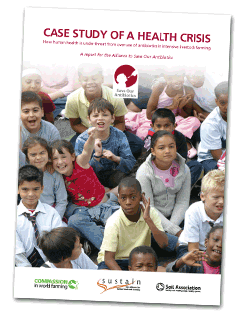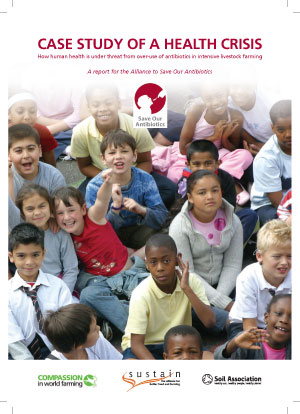Reports • Sustainable Farming Campaign
Case Study of a Health Crisis: Human health under threat from overuse of antibiotics in farming
 Case Study of a Health Crisis finds there has been an alarming rise in new farm superbugs, especially MRSA and E. coli that are passing to humans. The report links this rise to the fact that nearly 50% of all antibiotics are used in farming and argues that one of the fundamental causes of food and animal-related antibiotic resistance is factory farming.
Case Study of a Health Crisis finds there has been an alarming rise in new farm superbugs, especially MRSA and E. coli that are passing to humans. The report links this rise to the fact that nearly 50% of all antibiotics are used in farming and argues that one of the fundamental causes of food and animal-related antibiotic resistance is factory farming.
Every time a person or animal receives a dose of antibiotics, this is an opportunity for resistant bacteria to develop. The greatest risks arise when humans or animals receive low doses, as this offers ideal conditions for bacteria to hone resistance.
Committees charged to investigate over the past two (and more) decades have raised alarm bells, recommending urgent action to curb low-level use of antibiotics in farming. The world’s public-health experts, from the European Union, the U.S. and the World Health Organisation, are agreed that resistant bacteria are created in food animals by antibiotic use and that these resistant bacteria are being transmitted to people.
More recently, high-level public health authorities including the European Medicines Agency and the European Food Safety Authority have stated publicly that it is essential to curb antibiotic use in farming, and the time to act is
now, before it is too late. Yet despite this, the veterinary drugs industry and factory-farming lobby continue to dispute the science and oppose major reforms.
This report pulls together and sets out convincing evidence that over-use of antibiotics in farm animals has already resulted in the following:
- farm animals are breeding grounds for antibiotic-resistant strains of Salmonella, Campylobacter and E. coli;
- farm animals harbour antibiotic-resistant strains of MRSA that could become virulent; and has contributed to:
- diminishing effectiveness in human medicine of critically important antibiotics such as cephalosporins.
The report - backed by a consortium of organisations - Compassion in World Farming, Sustain and the Soil Association - asserts that such misuse of antibiotics is unnecessary, unethical and irresponsible.
Report contents
Foreword
Summary
Chapter 1: Antibiotic use in farm animals – history and emerging concerns
Chapter 2: Animals on antibiotics – a symptom of a sick farming system
Chapter 3: The food-poisoning bugs – Salmonella, Campylobacter, E-Coli
Chapter 4: Livestock-related MRSA – reaching the human community
Chapter 5: The threat to human health – risk levels assessed
Chapter 6: Sharing the medicine cabinet – the overlap in animal and human antibiotic use
Chapter 7: Avoiding routine reliance – a blueprint for better farming
Key recommendations
Glossary
Appendices
References

Case Study of a Health Crisis: Human health under threat from overuse of antibiotics in farming
2011 | 1597Kb
Published Thursday 17 November 2011
Sustainable Farming Campaign: Sustain encourages integration of sustainable food and farming into local, regional and national government policies.